The Top Shelf: The Battle Royales 02: Silent Hill
By Mento 4 Comments
Welcome to The Top Shelf, a weekly feature wherein I sort through my extensive PS2 collection for the diamonds in the rough. My goal here is to narrow down a library of 185 games to a svelte 44: the number of spaces on my bookshelf set aside for my PS2 collection. That means a whole lot of vetting and a whole lot of science that needs to be done - and here in the second round, that means narrowing our laser focus to one game per week (at least). Be sure to check out the Case File Repository for more details and a full list of games/links!
Extra Note: We're down to the wire now, just a few loose ends to tie up. Specifically, figuring out which of two (or three) very similar games from the same franchise is the superior entry. Our strict one-game-per-franchise policy means we'll need to bring in some science to determine the truly shelf-worthy here in The Top Shelf's third round: The Battle Royales!
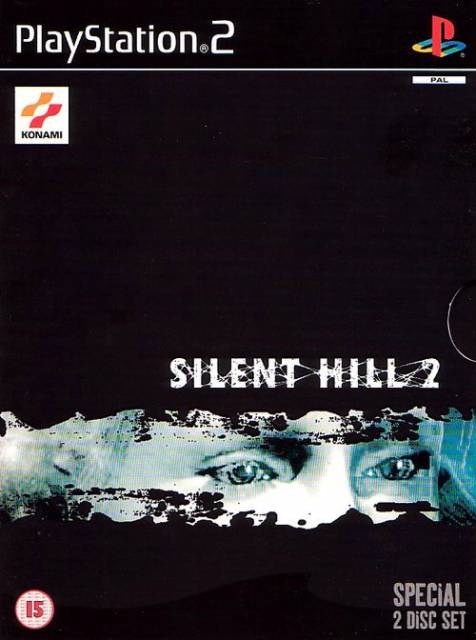
The next two games to enter the fog of war are Konami's second and third entries in their Silent Hill franchise, both of which make very strong cases for the best game in what is arguably the best survival horror series. While they're both cornerstones of my PS2 collection, my mind's a little hazy on the exact particulars, so if I mist anything important please let me know in the comments below. I doubt I'll have forgotten enough for this whole endeavor to go up in smoke, though.
Silent Hill 2 concerns widower James Sunderland who is brought to the titular cursed town by a mysterious message from his deceased wife. The town of Silent Hill takes on this bespoke rendition, drawing much of itself and its enemies from James's memories of the place, his survivor guilt, and his many hang-ups which eventually begin to paint a picture of the type of man he truly is. Likewise, you see tantalizing snippets of the journeys of other visitors, each of whom is implied to be suffering their own equivalent personal hell. Whereas Silent Hill 1 was eager to play up the town's issues as due to the fallout of a botched demonic ritual - very common in Japanese horror games, see also Fatal Frame and Siren - Silent Hill 2 gives it a sort of sapience, where it studies the lost souls who drift through and finds ways to torment them directly.
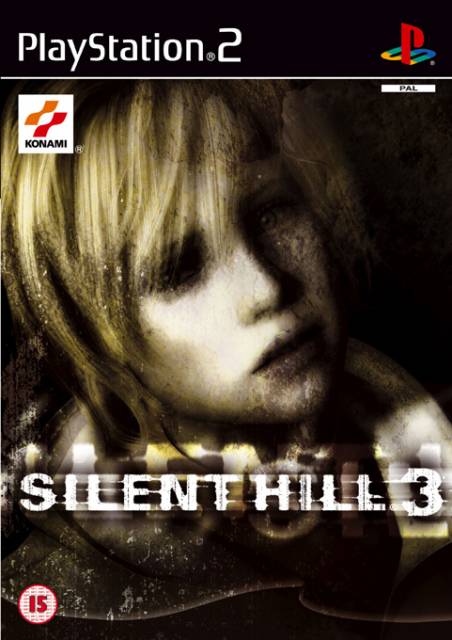
Silent Hill 3, conversely, returns to that botched ritual storyline of Silent Hill 1 and continues the narrative some seventeen years afterwards with the now adult(ish) adopted child of its protagonist, Harry Mason. Heather Mason finds herself entering the town in pursuit of revenge, and proves to be remarkably resilient to the town's bullshit. Not just physically resisting the monsters that prowl around with whatever weapons are handy, but not letting the terror of the place overwhelm her senses or deter her from her goals, which we eventually discover are part of the role the town has for her. In addition to a more assertive protagonist, the game's got the lion's share of the best scares in the series, and is perhaps a truer sequel given it focuses on the series-wide ritual plot. This aspect, like so many others, will be one of the more subjective qualities I'll be exploring with this episode of The Battle Royales.
First, let's establish the categories. There's just five this week, since last week's Final Fantasy seven-category showdown went a little long: Story, Characters, Scares N' Spooks, World Design, and Monster Design. I've done away with the more typical categories like Gameplay and Graphics because the games more or less play the same and have a similar level of graphical fidelity; logically, if I'm to figure out which of the two I prefer, it'll be in how they are the most different.
Story
A good story is important to survival horror because the player needs every incentive to push themselves through the paralyzing tension that awaits, and a strong narrative thread to follow is perhaps the best incentive there is. Well, besides maybe your console spitting out a whole pizza if you win, but the technology for that isn't quite there yet.
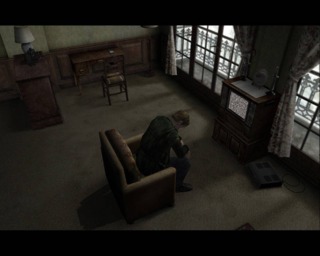
Silent Hill 2's story is one that frequently moves the goalposts, at least in terms of player expectation. We know James is in the town to find his wife, and for much of the game's runtime he's moving from one location to the next to figure out where she might be hiding - her note simply suggests a "special place" for the two of them, that James has naturally forgotten all about. Along the way he gets caught up in the travails of abuse victim Angela, the simpleminded psychopath Eddie, and the bratty kid Laura who claims to have met James's wife, Mary. There's also Maria, a sultry doppelganger of his comparatively straitlaced wife. At several points in the game, most noticeably with a procession of holes in the ground and the constant deaths of Maria, reality appears to fall apart and it's around this time that James finally puts the pieces together and figures out what he did and what the town is doing to him. The best element of Silent Hill 2's story is its sense of mystery, especially in how it deliberately withdraws information from the player until the final moment. For instance, it becomes far easier to understand Angela and Eddie once you've learned about their backstories and have seen a brief glimpse of Silent Hill from their eyes. More pressing, however, is what they have in common with James, and how that might be the reason they've all been brought to the town. A great thread that runs throughout the Silent Hill series is how every visitor sees something different, and the town becomes that much more hostile to those with sins to hide. The game can then conclude one of three ways (excepting the three bonus endings, which are new game plus only and mostly goofs), and any one of them works as a satisfactory conclusion depending on your own feelings about James and his actions.
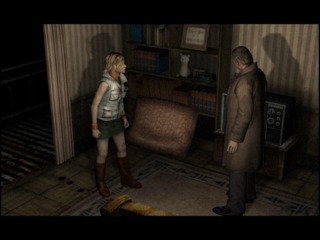
Silent Hill 3's prologue ends with a shocking revelation, and from there we're off to the races with Heather's journey through Silent Hill. Rather than feeling sorry for herself like James, letting the Perdition-like nature of the town completely dominate him psychologically, she's an assertive woman on a mission and only ever lets the horrors of the town briefly waylay her. She still ends up bouncing from location to location, because it wouldn't be a Silent Hill game if you could just walk directly to where you needed to go, but she has an all-inclusive no-BS policy and doesn't let herself be swayed by the various other characters in the town, most of whom work against her as remnants of the cult that rendered the town a hellscape after trying to sacrifice the young psychic Alessa. She's still prone to moments of vulnerability, but her righteous anger is also her shield as her close resemblance to Alessa during those moments is enough to convince the powers behind the town to leave her be. Of course, it turns out that the town is deliberately not pushing her too hard for a specific reason, and leads to a potentially world-ending disaster that requires some quick thinking to avert. It's a far more traditional narrative, both in terms of Silent Hill and for survival horror in general, where you have this star-crossed ingenue out of her depth surrounded by NPCs she probably shouldn't trust, but you might argue the case that there's something about that familiar template that makes it easier to subvert.
Advantage: Silent Hill 2.
Characters
The ensemble cast of a survival horror game tends to be one of two things: very few, and very inconsequential in the long run. To Silent Hill's credit, they put a lot of effort into their ancillary characters, treating them to their own leitmotifs and independent plot threads to which the protagonist, and by extension the player, is only partially privy to. When you next meet a character after they've introduced themselves and wandered off, you get a sense that they've seen some equally - though probably not identical - disturbing business and have been changed by those experiences, or in the case of the villains they've proceeded further in their plans to thwart you.
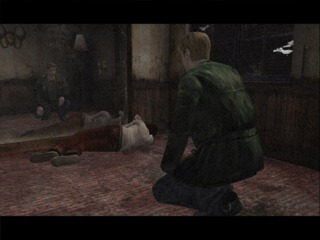
With Silent Hill 2, you have the aforementioned visitors Angela, Eddie, Laura, Maria and the late Mary herself, the status of whom remains a big question mark up until you finally meet her at the end of the game. While Eddie's storyline is cut short by his sudden assault on James and getting himself killed in self-defense, Angela's is a bit more involved and draws in her abusive father and her guilt in fighting him off. You get the sense that if she was the protagonist, the game would be far darker than it already is. Maria doesn't so much exist as a person but as another metaphysical weapon in the town's psychological arsenal, but still manages to acquire some semblance of an identity and will start to fight against her unwilling role in James's suffering. The only character I don't like is the kid Laura, for obvious reasons if you've spent any time with her in-game, but the idea that - as an innocent - the town refuses to threaten her in any way is a neat twist, in part because it implies a lot of guilt on James's part as a man who is constantly under attack from the town's monsters. What I appreciate most about Silent Hill 2's characters is that, with the exception of Mary/Maria, they aren't there for James's benefit beyond existing as parallels the player can draw between them and the ostensible hero, and suggests that while Silent Hill has formed itself to be James's personal torture chamber it's not exclusive in its judgemental wrath to the guilt-ridden. Like Carly Simon famously sang, "You're so vain, you probably think this shapeshifting hellscape that preys on your own potent feelings of remorse is about you".
In Silent Hill 3, the characters are a little more nuanced in their motivations, but still are every bit there for Heather and her journey. Douglas is a slovenly private eye that has a minor antagonistic role after he accosts Heather in the mall before the world goes to the (mummified, head-opening) dogs. As the game's only other rational human being, he eventually becomes a minor supporting role and helps Heather get to Silent Hill and spends the rest of his time slowly bleeding out in the amusement park. As for the cultists, Claudia's your typical fundamentalist nut with her own sordid history and her father Leonard's inexplicably a big sewer monster who is understandably a little confused when Heather comes to visit. Vincent's a bit more of a wildcard, as someone who is technically working against Heather as a member of the antagonistic cult but actually despises Claudia more, and so tends to operate in an "enemy of my enemy" allied role up until Claudia realizes what he's been doing. Beyond that, the game is generally more happy to let Heather be alone as she explores Silent Hill, in part because loneliness is such an integral aspect of her characterization after the prologue.
Advantage: Silent Hill 2.
Scares N' Spooks
The draw of any survival horror game, at least nominally, is the horror itself. You play these games to get disturbed, to freak out, to leap out of your chair when you open a door to find a skeleton behind it, or just persist in a constant state of fear and suspense. A lot of design issues endemic to the genre, from the frequent backtracking to the long stretches of relative calm as you go about solving puzzles and looking for key items, exist to serve this atmosphere of oppressive dread of what's to come. Stands to reason that the game with the best scares has an ace up its sleeve.
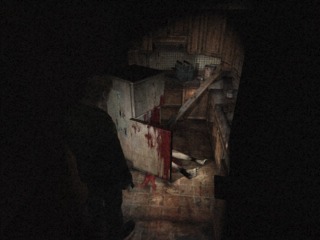
Silent Hill 2's horror, like everything else about it, definitely errs on the psychological side. As James continues to sink into a depression and loses his grasp on reality, the town accommodates him with impossible geometry and an off-the-rails sequence or two. It's also big on terrifying implications, as you piece together what the other characters are seeing and the scope of James's guilt. Beyond a certain fellow with a Platonic solid for a noggin, who presents that common trope of a fearsome, undefeatable, and persistent foe scuppered only his relative slowness, there aren't any particular moments or sequences that stand out as particularly scary. It's really more in the subtle ways the game's atmosphere sits between chilling and suffocating, like how a hallway is filled with heavy breathing sounds or you'll get hit with radio static only to turn around and see an enemy quietly observing you from behind an impassable metal grate. Finding a corpse with James's coat and hairstyle, but so mutilated that you can't make out a face. Sometimes you really have to be paying attention, but when you are that's when the game starts messing with you. It's less a terrifying game than one that puts you in a constant state of unease, even when there isn't any obvious danger nearby.
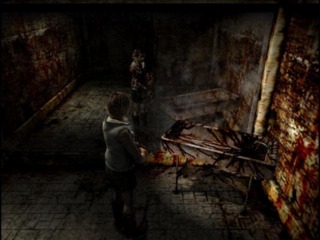
Silent Hill 3, meanwhile, has some of the best set-pieces in the entire series. If I'll remember anything about Silent Hill 3 in another twenty years, it'll be sequences like the mirror room in the hospital or the theme park's haunted house chase which exacerbates the already perturbing imagery with just how bizarre and unexplained these events are, which is the aspect that sticks with you long after the visceral scare has worn off. Everything about the mirror scare in particular, such as the way the blood in the mirror starts filling up in the room you're in, or how your completely blood-drenched reflection stops moving, is an expertly-directed exercise in creeping dread that tests the player to see how long they can last before freaking out and leaving the room. It even works the second time: there's a point where you can no longer leave and are effectively doomed to an instant and inexplicable death, and just before that moment would be as far as you're ever willing to let this scene go the second time you visit except it's not always clear when that point arrives. Both games have their gaggle of jumpscares (fortunately not overused) and do an expert job with the sound and visual design to unnerve the player, but Silent Hill 3 definitely has the edge.
Advantage: Silent Hill 3.
World Design
The malevolent malleable nature of Silent Hill means that while a few landmarks stay the same the experience of exploring the town is considerably different for the two characters. It'd have to be, otherwise they'd be fairly unsurprising sequels.
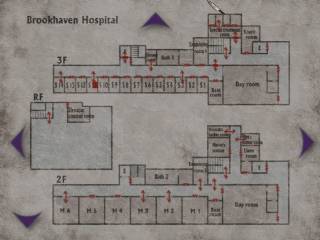
In Silent Hill 2, James visits (in order): A graveyard (where he meets Angela), an apartment complex (where he meets Eddie and sees Pyramid Head for the first time), the Rosewater Park (where he meets Maria), Pete's Bowl-O-Rama, Brookhaven Hospital, The Silent Hill Historical Society, and finally the Lakeview Hotel. Of note are the apartment complex which despite being incidental to where James is heading is nonetheless filled with imagery and events that prove critical to his journey and understanding of the town, the Brookhaven Hospital which is your compulsory visit to a place of healing transformed into the opposite, and the Silent Hill Historical Society that warps to resemble a prison and a sewer labyrinth, though neither makes a whole lot of geographical sense and can be seen more as the town putting James through the insanity wringer as he gets closer to his destination. I'm a big fan of any horror game that goes for impossible geometry to unsettle its players, though functionally it's a little awkward to navigate. It's sort of a push and pull thing: you want to give players the sort of environment that will perturb them but not have them be completely lost, because then the desired state of dread will quickly turn into the undesired state of frustration after they've spent enough time running around in circles.
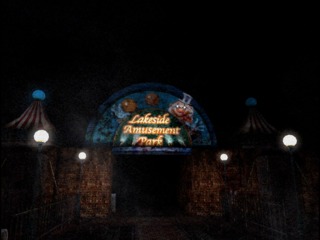
With Silent Hill 3, you have: the opening mall, the subway, Hilltop Center apartments, Brookhaven Hospital, Lakeside Amusement Park (which Heather also briefly visits during the prologue), and the Chapel housing the cult. The first three locations are actually outside of Silent Hill, which triggers alarm bells that there's something about Heather (or the cult) that is directly transforming these places into their Otherworld nightmare versions despite the fact that they're outside of Silent Hill's jurisdiction, as it were. The apartment complex and the hospital operate under similar rules, and have more or less become Silent Hill staples at this point, but the amusement park does a great job of rendering an already unsafe and anxiety-inducing location into more of a nightmare with how it twists the fairground illusion of danger (the roller coaster) or scares (the ghost house) into more literal versions. I also thought the mall made for a smart opening chapter, stereotypes aside for the sort of location a teenage girl might find herself trapped in, because of its use in classic horror fiction (the fairground too) and how they offered more variation in the visuals than another building full of corridors with a dozen doors to scratch off a map. (For the record, I could see someone going the opposite way: Silent Hill 2 establishes comparatively mundane environments only to turn them onto their head, making the horror of a regular building suddenly turning demonic that much more effective. Giant pits aside, though, I'll have to give this one to Silent Hill 3.)
Advantage: Silent Hill 3.
Monster Design
Here we go. Silent Hill stands out among its peers for its imaginative monster designs, which can either represent certain manifestations of sins or psychoses, or simply be horrifying whoosits to hit with an iron pipe depending on how invested you are in the series's symbolism.
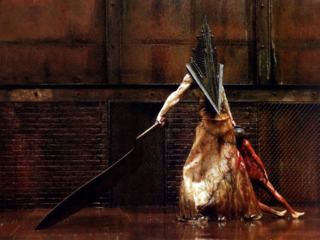
In Silent Hill 2, the enemies are explicitly meant to represent aspects of James Sunderland's fractured and guilt-ridden psyche, each one representing a different negative aspect of himself that causes him shame and remorse. The vaguely sexualized nurses and mannequins are the guilt he feels for being attracted to other women while his wife was infirm, ugly creatures stretched across bed frames that represent James's guilt of finding his bedridden wife difficult to look at, and there's of course Pyramid Head who represents his subconscious desire to face judgement for a crime he's managed to consciously block out. The one exception is an enormous boss that is implied to be one of Angela's demons instead, representing her abusive father, that James only ends up fighting once the two cross paths briefly. We don't see Eddie's enemies, but there's an implication that they simply laugh at him rather than causing him direct harm, which draws out his psychotic anger at the world and later James for treating him like a dimwitted fool. Because they all have this central theme, the designers have fun building each monster around a concept and distorting them to the point where they're hardly recognizable. I'm a particular fan of Pyramid Head's design, from his enormous and indestructible tetrahedron to the enormous knife that he has to drag along the ground everywhere he goes.

Silent Hill 3 can only attempt to follow in Silent Hill 2's stead with a selection of familiar and less familiar enemies that include the monolithic Closers, the irritating Pendulums, the ever-present twitchy Nurses, and the gargantuan Insane Cancers. Of particular note is the divine final boss, which represents the kind of God I can absolutely believe the people of this cult would worship. It reminds me of Conan the Destroyer, of all things, where the reality of what their "god" looks like is a far cry from the beautiful human form it is always depicted as in artistic works. Easier to sell your God to potential followers when you downplay the whole "gross monster" aspect. In fact, all the bosses in Silent Hill 3 look amazing in their viscera-laden grossness, and I'd say that variation was the one area in terms of monster design where it might have Silent Hill 2 beat. The Missionary is a brutally violent opponent that makes for a good early boss before they become regular enemies far later in the game, Leonard presents a particularly troublesome foe with the way he ducks underwater and emerges behind you, and there's a particularly memorable showdown with the Memory of Alessa: a clone of Heather who represents who Heather might've become had Alessa's psychic possession of her child form in Silent Hill 1 had been completed. (This bloodied, black-haired form of Heather pops up in a few other places before, foreshadowing this showdown.) Overall, though, I think Silent Hill 3 spends most of its time trying to chase the highs of Silent Hill 2. I'll give SH3 this though (and it's a trap that future Silent Hill games would fall into): they didn't bring back Pyramid Head for no discernable reason other than because he was popular.
Advantage: Silent Hill 2.
Conclusion
As with Final Fantasy X last week, I find myself going with the general consensus on this one, opting for James Sunderland and his marital issues over Heather Mason discovering her destiny. It's another close one, at least, with three votes to two in favor of Silent Hill 2. Like with the Fantasy Fantasies last week, this would be one where I'd normally have to flip a coin if there wasn't all this useful science around to help settle matters.
Result: Silent Hill 2 progresses directly to the Shelf while Silent Hill 3 is eliminated. Them's the breaks. Catch you next time when I settle a dispute between a rabbit-cat and his robot.
